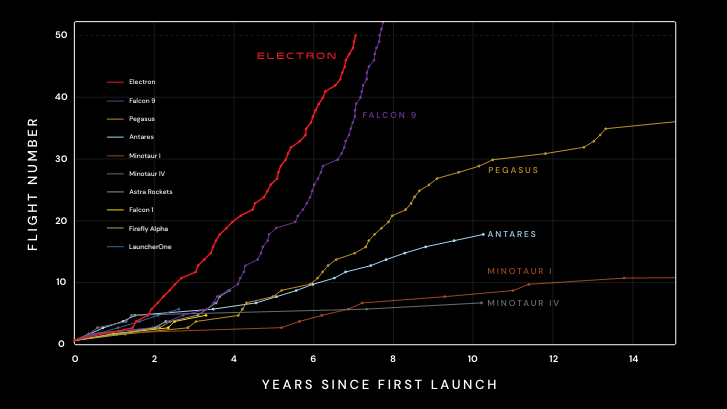Latest News

Electron’s 50th mission on June 20. Photo: Rocket Lab
Rocket Lab reached the milestone of 50 Electron launches on Thursday with a mission for French IoT startup Kinéis. The launcher reached 50 Electron launches seven years after the first flight, which Rocket Lab notes is faster than any other commercially developed rocket in history, even the Falcon 9.
The mission, named ‘No Time Toulouse’ for the city where Kinéis is based, lifted off at 2:16 p.m. EDT on Thursday, 6:16 a.m. local time in New Zealand on Friday morning. Electron deployed the first five satellites of the Kinéis IoT constellation. Another launch is set for this summer to deploy five more.
The Kinéis nanosatellites are built on a 16U platform and are equipped with an IoT and automatic maritime identification system (AIS) payload. Kinéis plans to serve industries and use cases like agriculture, monitoring fixed infrastructures and energy networks, monitoring transport and logistics, and tracking wildlife and livestock and defense.
Electron debuted in May 2017 in a test flight that achieved first stage separation and fairing separation, but failed due to a software issue. The second launch attempt in 2018 was successful.
After the first test flight, Rocket Lab has had 45 successful launches and three failures that affected customers — one in 2020, 2021, and another in 2023. Overall, Rocket Lab has deployed 190 satellites.
The company has ramped up its lauch cadence year-by-year and hit a record of 10 annual launches in 2023. Thursday’s launch was its seventh of this year.
CEO and founder Peter Beck commented on the significance of being the first rocket to reach 50 missions during the launch broadcast, and the importance of customer trust.
“It shouldn’t be forgotten that we weren’t the preordained winner of the small launch vehicle race. I can remember raising capital in Silicon Valley and the first question that I would always get is, ‘Why do you think you can beat Virgin Orbit and Richard Branson?” Beck said. “For me it was always really obvious that the product that we were building was the right fit. The team were working their butts off. We had the right engineering and the right product for the market at the right time.”
“You can produce as many rockets as you want, but if you don’t have the customers, then it doesn’t work either. There’s a huge sense of gratitude from us for all of our customers — but especially the early ones who are really the pioneers in small launch along with us,” he added. “Being the first to 50 really matters because we’re all competitive in this industry. It’s an important driver for the people and for the company. Everybody is pushing and continues to push to build vehicles and get customers in orbit faster and faster.”

Rocket Lab graphic illustrates launch vehicle paths to 50 missions. Screenshot via Rocket Lab
Beck said Rocket Lab has done some of the “craziest things you can think of with Electron,” referencing the Capstone mission to the Moon, HASTE suborbital mission, and rendezvous mission.
The company has also worked to make Electron reusable and launched a previously flown Rutherford engine last year.
Earlier this week, Rocket Lab signed its largest launch contract to date — a 10-launch deal with Japanese radar company Synspective.
The company is now working on its next rocket, medium-lift Neutron rocket, which will debut in mid-2025 at the earliest.
Stay connected and get ahead with the leading source of industry intel!
Subscribe Now